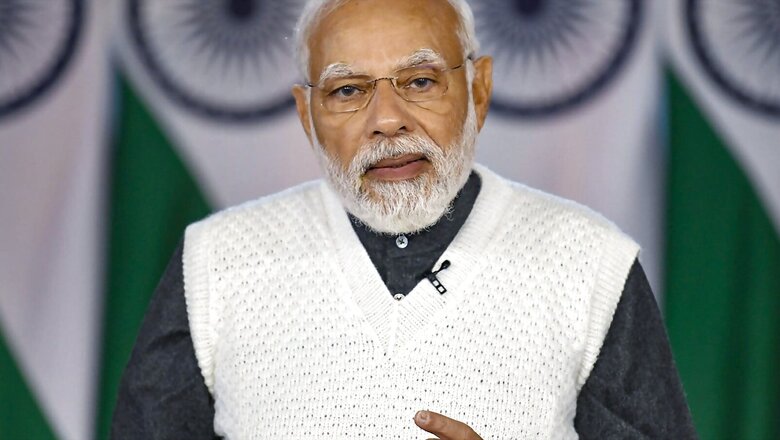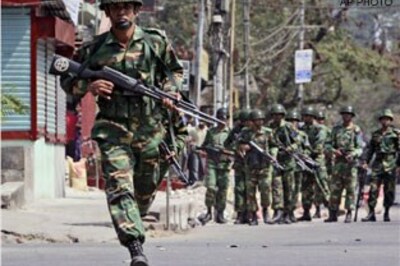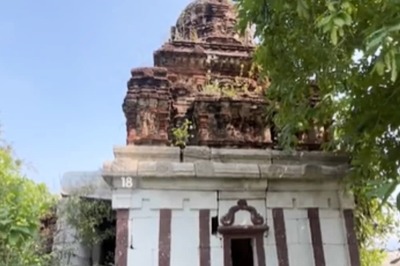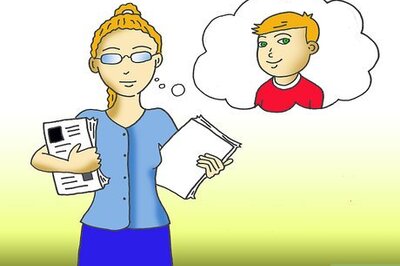
views
India officially assumed G20 presidency on December 1, 2022 and the fact that this happened in the year we celebrated Azadi ka Amrit Mahotsav makes it even more special. And now, the G20 presidency is set to be a watershed moment for PM Narendra Modi’s New India as it seeks to address and redress key global challenges.
G20 presidency under Modi will further enhance foreign investments into India as it matches forward en route to becoming a global superpower after growing at 8.7% last year and is slated to be the fastest growing economy this year too, despite a looming global recession.
In a deeply divisive world, torn apart by geopolitical conflicts, multilateralism has often been threatened. From decarbonisation, fighting climate change, boosting indigenous technology, to restoring stability to a deeply divided multipolar world order, India has its role cut out. G20 presidency will be a huge boost to India’s image on the global stage providing it with unprecedented opportunities.
This is not merely a diplomatic achievement for India but a new responsibility and a measure of the world’s trust in India. Notion of universal brotherhood that is being reflected via the G20 lotus in the logo is a symbol of hope in these tough times. “One Sun, One World, One Grid” has been India’s clarion call for a revolution in the area of renewable energy, while the global health impetus under the “One Earth, One Health” campaign has also put India in pole position.
“Environment is a global cause for us as well as a personal responsibility. It will be our effort that there should be no first world or third world, but only one world. Our G20 mantra is – One Earth, One Family, One Future,” said PM Modi at the historic G20 meet in Bali, Indonesia.
The G20 presidency will be a great opportunity for India under Modi to showcase a glimpse of our age-old tradition of “Atithi Devo-bhava” or ‘Guest is God’. During the G20 presidency, India will hold over 200 meetings in over 32 different sectors in multiple locations.
PM Modi has reinforced that India’s G20 presidency will be inclusive, ambitious, decisive and action-oriented, noting that the country is taking the charge at a time when the world is grappling with geopolitical tensions, economic slowdown and rising food and energy prices. India will work jointly with other G20 nations toward bridging the digital divide.
“The principle of ‘data for development’ will be an integral part of the overall theme of our presidency,” Modi reaffirmed.
G20 is the premier forum for international economic cooperation representing around 85% of the global GDP, over 75% of the worldwide trade and about two-thirds of the world population. The G20 logo is not just any logo but a resolve that has been omnipresent in our thoughts through ‘Vasudhaiva Kutumbakam’ or universal brotherhood.
A politically and morally bankrupt Opposition desperately tried to politicise the lotus in the logo which has nothing to do with the BJP’s symbol. The lotus in the G20 logo symbolises hope in tough times and reposes faith in India’s ancient heritage, faith and thought. The philosophy of ‘Adwait’ emphasises the oneness of all creatures and this philosophy will be a medium of resolution of today’s conflicts.
The lotus-themed logo, therefore, represents many key messages from India. Also, both the Goddesses of knowledge and prosperity are seated on a lotus.
Prime Minister Modi pointed out how the lotus in the logo of G20 symbolises both shared knowledge and shared prosperity which enable us to reach the last mile. The seven petals of the lotus represent the seven continents and seven universal musical notes. When the seven musical notes come together, they create perfect harmony. Likewise, G20 aims to bring the world together in harmony while respecting diversity.
Today, there is an unprecedented curiosity in the world to know and understand India. Democracy, diversity, indigenous approach, inclusive thinking, local lifestyle and global thoughts are the defining themes today which India’s presidency of G20 under PM Modi seeks to reinforce.
The contribution of Ayurveda, global enthusiasm for yoga, encouraging millets and coarse grains, use of digital technology in development, inclusion, removal of corruption, improving ease of doing business and ease of living and India’s women empowerment via financial inclusion through the Jan Dhan Accounts can be templates for many countries, which India will reaffirm under its presidency.
The world is looking with hope towards collective leadership, whether it is G7, G77 or UNGA. In such a situation, India’s presidency of G20 assumes greater significance, for all the friends of the ‘Global South’ who have been India’s co-travellers on the path of development for decades.
In line with his inherent magnanimity, PM Modi requested all state governments as well as all other political parties to actively take part in the forthcoming G20 events in India, as events will not be limited to Delhi or a few places but rather will be held in every corner of the country.
Sanchit Gupta, noted journalist and freelancer, sums it up wonderfully well when he says: “Getting the mega opportunity to host the G20 Summit is not just a giant opportunity to boost tourism and bring in numerous investment opportunities for India which is the 5th largest growing economy but it is also a platform for the South Asian Nation to alter the perception that India has not invested sufficiently in global multilateral engagement.”
“The Group of 20 which comprises of 19 nations + the European Union is a solid forum for developed and developing nations to engage and discuss policies for improving economic governance at the global level and India assuming the G-20 Presidency is a chance for the nation to put forth the idea of sustainable growth and inclusive development, ideas Modi has been seriously focused on,” he adds.
Suffice to conclude by saying that PM Modi’s foreign policy has seen many firsts –Modi was the first PM to visit Israel in 2017 in 70 years. Apart from de-hyphenating India’s foreign policy with respect to Israel and Palestine, India’s civil nuclear agreement with Japan signed in December 2015, signing the Logistics Exchange Memorandum of Agreement LEMOA with the US in August 2016, signing the Communications Compatibility and Security Agreement (COMCASA) in September 2018, signing the Basic Exchange and Cooperation Agreement for Geo-spatial Cooperation (BECA) in October 2020, rejuvenating the Quadrilateral Security Dialogue (QUAD) which had been lying decadent despite being formed in 2007, joining the missile technology control regime (MTCR) in 2016 and forcing China to voluntarily disengage in February 2021 post the Galwan stand-off are landmark milestones.
In September 2018, the first 2+2 ministerial meeting with the US was held in New Delhi. The second edition of the meeting was held in Washington DC in 2019. Indo-US relations have only grown stronger.
Interestingly, thanks to PM Modi’s innate diplomatic skills, India’s relations with Russia have also moved from strength to strength. Russia started the delivery of the first regiment of the S-400 missile systems in December last year while it began supplying the second one in April this year.
The missile system has already been deployed in such a way that it can cover parts of the border with China in the northern sector as well as the frontier with Pakistan.
In March this year, Russia said there will be no impact of the western sanctions against it on the supply of S-400 missile systems to India. Remember, Western countries imposed severe sanctions on Russia following its military invasion of Ukraine. It was in October 2018 that India signed a $5 billion deal with Russia to buy five units of the S-400 air defence missile systems, despite a warning from the Trump administration that going ahead with the contract may invite US sanctions.
While India has abstained from the votes at the UN platforms in condemning the Russian aggression, PM Modi at the SCO meet in September, pressed for a dialogue between the warring nations and called for restraint, saying war is never a solution. Modi has been pressing for the resolution of the Ukraine-Russia crisis through diplomacy and dialogue, repeatedly.
Speaking of milestones, it may be recalled that the last papal visit happened in 1999 when Atal Bihari Vajpayee was the Prime Minister and Pope John Paul II came to India. Now, it is during PM Modi’s term that the Pope was invited to visit India, when PM Modi met Pope Francis, ahead of the G20 summit in Rome, in October 2021. Moot point here is Modi is truly a global leader who has never been reticent or reluctant to reach out.
When India won the non-permanent membership of the United Nations Security Council (UNSC) in 2020 for two years, don’t forget India won 184 of the 192 valid votes cast, in a fabulous endorsement of India’s global outreach under the astute leadership of Prime Minister Narendra Modi.
PM Modi at that time stressed on Five Ss – Samman (Respect), Samvad (Dialogue), Sahyog (Cooperation) and Shanti (Peace), to create conditions for Samriddhi (Prosperity).
“India’s overall objective during its tenure in the UN Security Council will be the achievement of N.O.R.M.S—New Orientation for a Reformed Multilateral System,” PM Modi had said then. And true to his commitment, India under Modi has been tirelessly working towards a post-Covid global order that is based on shared values, shared respect, shared trust and shared friendships, with India’s G20 presidency being a key pivot going forward.
Under the G20 presidency of India, Ahmedabad, a UNESCO World Heritage city, will host the Urban-20 (U20) cycle. Along with C-40 (Climate 40) and United Cities and Local Governments (UCLG), two international non-governmental advocacy groups on urban issues, Ahmedabad will organize various events, including City Sherpas’ inception meeting on February 9-10, 2023.
Ahmedabad city has been actively working on climate change and sustainability issues for several years now. The first G20 Finance and Central Bank Deputies meeting (FCBD) under the Indian Presidency was held in Bengaluru, Karnataka, during December 13-14, 2022, with an enthusiastic gathering of over 160 foreign delegates including deputies from G-20 member countries, invitee countries, and international organisations.
The discussions focused on issues relating to the global economy and risks, strengthening Multilateral Development Banks (MDBs), managing global debt vulnerabilities, financing climate action and Sustainable Development Goals (SDGs) and building resilient, inclusive and sustainable cities of tomorrow.
When we announced our goals in Paris, many asked whether India under PM Modi would be able to achieve something like 175 GW of renewable energy. But today India is not only achieving these goals rapidly but is also working to set higher targets.
Going beyond its Paris commitments, India has set a target of rehabilitation of 26 million hectares of wastelands. Indian Railways, the world’s largest passenger carrier serving an average of 8 billion passengers every year, has resolved to achieve ‘Net Zero by 2030’. With this decision, Indian Railways will mitigate carbon emission by 60 million tons per annum.
We are working on the target of 20% ethanol blending in petrol by 2025. By increasing the count of Asiatic lions, tigers, rhinos, and dolphins, India has proved that our commitment to protect the environment is not limited only to the energy debate.
India under Prime Minister Narendra Modi has never retreated from the responsibility of mitigation, nor will it ever go back. Due to the efforts made over the last eight years, today India is one of the top five countries in the world, in terms of renewable energy capacity.
The world also recognizes this success of India and the G20 presidency will only carry forward the enduringly powerful legacy of PM Modi with respect to climate goals, energy and food security and related themes.
Sanju Verma is an economist, national spokesperson of the BJP and author of ‘The Modi Gambit’. Views expressed are personal
Read all the Latest Opinions here




















Comments
0 comment